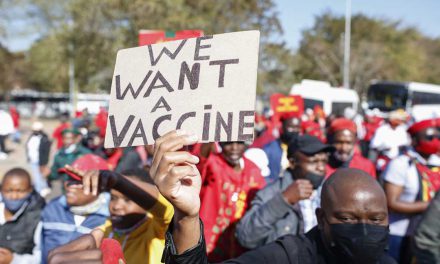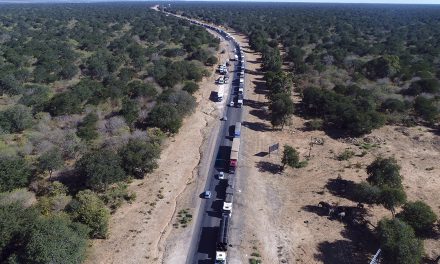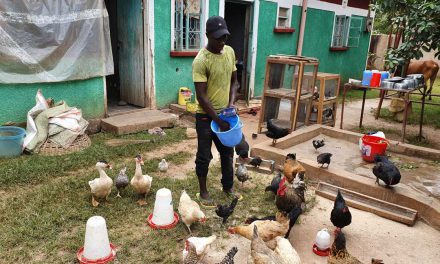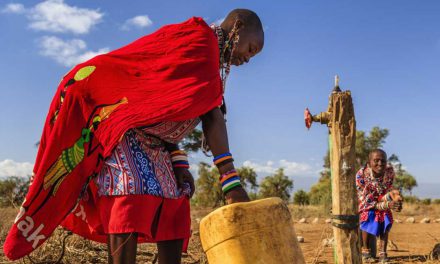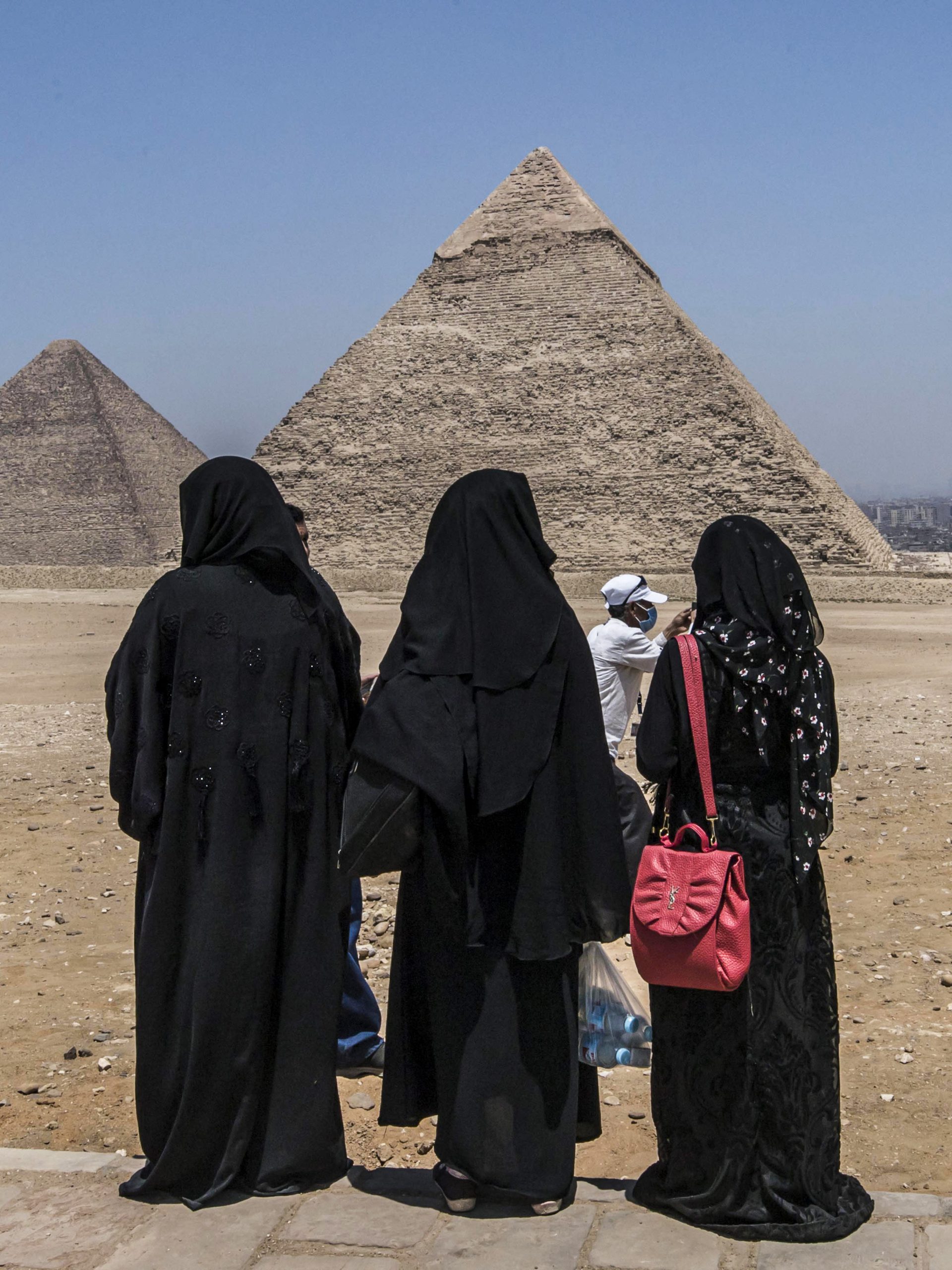
Yemeni women visit the Giza pyramids outside Cairo, Egypt after the COVID-19 restrictions are eased, July 2020Photo: Khaled Desouki /AFP
Imagine the ideal tourist destination: a magnet for people from all over the world, safe, full of beautiful natural sites, with urban delights such as music concerts and theatres, friendly locals, and perhaps even opportunities for business-minded individuals. These features would only be possible in a well-run state that is politically stable, with a developed middle class and decreasing poverty, efficient public transport, and thriving cultural activities.Measured against this picture, only relatively wealthy African countries qualify as tourist attractions, mainly because of colonisation, underdevelopment, instability, poverty and crime.
Nevertheless, Africa has been heavily reliant on tourism, which accounts for 8.5% of the continent’s GDP, and employs about 24 million people, according to a February 2021 Brookings Institution report. But this was before COVID-19 changed everything. The virus has been the most disastrous shock to tourism in Africa and indeed the entire globe. The speed with which it spread and imposed emergency measures was unlike anything we have seen in our lifetimes. The United Nations Sustainable Development Goals (SDGs) 2030 have been set back. SDGs, such as plans to cut unemployment, poverty and inequality, have had to be suspended to give priority to questions of health and the maintenance of life itself.
Writing in August 2021, just over seven-million Africans have been infected, up to 2.6 million in South Africa alone. In Morocco, the figure stands at 700,000 and in Tunisia 610,000. Official figures put the death toll in South Africa at about 82,000, but experts reckon it is closer to 200,000. The official African death toll stands at an unlikely 185,000.Tourism screeched to a halt soon after the World Health Organization declared COVID-19 a global pandemic on 11 March, 2020. International air travel came to a stop, borders and ports were closed, and the subsequent social distancing, quarantines, lockdowns and curfews shut down economic activity.
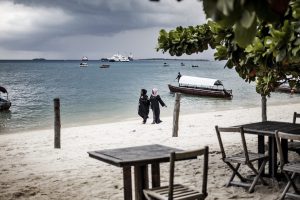
Empty tables at a tourist venue in Stone Town, Zanzibar due to COVID-19 restrictions, October 2020Photo: Marco Longari/AFP
Pandemics usually shift attention away from the danger zone and holidaymakers look to safer areas, but COVID-19 spread everywhere, so no alternatives remained for travellers. With economies shrinking, tourism has been hit harder than sectors less reliant on travel and human contact, the essence of tourism. As Kaitano Dube, one of the authors of Counting the Cost of COVID-19 on the Global Tourism Industry points out, tourism involves a chain of industries, which all ground to a halt across the globe and laid off millions of employees.
It is perhaps overly optimistic to speak of tourism in a post-pandemic era. During 2020, pundits foresaw that we would get a vaccine and that the pandemic would recede, but the Delta variant has brought home to us the possibly interminable nature of COVID-19. We are likely to be dealing with it for some years to come, which means the tourism industry will not achieve normality until society does.
To survive the pandemic, tourism will have to become more resilient and sustainable. Tourist destinations will have to pay special attention to sanitation. Kwakye Donkor, CEO of the Africa Tourism Partners consultancy, says the industry will have to change the products it offers even after COVID-19 subsides. Travel packages, he says, will change to include COVID-19 testing and arrangements for quarantine.
Communication will be digital, and there will be less contact between tourists and service providers, for example in how food is delivered and baggage transported. Room service at hotels will adapt to a new sanitary regime, where whatever is delivered will be covered in packaging.“We will go to the new normal, which means embedding the current protocols and compliance into product design, into service provision, into everything that we offer to the tourism sector, both on the demand and the supply side,” says Donkor. Packages in which friends or companions share facilities such as hotel rooms will no longer be offered.
“Packages that say all meals included, usually buffets, will change,” he says. “Buffets will still be served but people are going to be very careful about how they go about it.”But in the meantime, some countries are beginning to make attempts to recover, but whether their methods are sound is up for debate.For example, Zanzibar’s economy is dominated by income from tourism, perhaps more than any other in Africa. An island, which is an autonomous region of Tanzania, it drew as many as 376,000 visitors in the 2016/17 financial year.
When COVID-19 broke out, Zanzibar denied a health crisis existed, with reports that the island was keeping tourism going at all costs, even though many had died from the virus. A February 2021 report by Africanews and Agence France Presse said tourists were streaming into the island, believing it was a safe haven from the pandemic. Zanzibar authorities released a statement saying 51,574 people visited in February 2021.Egypt is a magnet for tourists and the country’s position in the Mediterranean makes it accessible to people from several continents. The country employs about two-million people in the tourism industry.
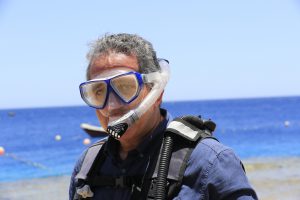
Egyptian minister of tourism and antiquities Khaled El-Enany inspects a diving centre at the Red Sea resort of Sharm el-Sheikh as Egypt gears up to welcome back tourists kept away by the coronavirus pandemic, June 2020. Photo: Khaled Desouki/AFP
In 2019 13-million people visited the country. Revenues for the 2018-19 year were in the region of $13 billion. After COVID-19 emerged, the country’s tourism sector, predictably, was hard hit and the numbers fell by 20%. But by May 2021 Tourism and Antiquities Minister Khaled El-Enany was announcing plans to vaccinate workers in hotels, resorts, businesses and restaurants in South Sinai and the Red Sea, the most popular sites. The minister is confident that up to six-million people will visit Egypt by the end of 2021. Africa’s tourism industry is heavily reliant on game parks, nature reserves and exhibiting the continent’s abundant wildlife. Kenya, Tanzania, Botswana and South Africa are the most popular destinations, where tourists go on game drives, safaris, walkabouts or, more dubiously, trophy hunting. According to the online journal Nature, Ecology and Evolution, Africa’s wildlife tourism employs 3.6-million people on the continent and generates $29 billion annually.
A June 2021 United Nations Conference on Trade and Development (UNCTAD) report shows that East Africa’s tourism decline will contribute to a loss of 9.3% to the region’s economy this year (North Africa 7.5%, southern Africa 6.3%, West Africa 4.6%, and other SACU countries 5.8%). The return of wildlife tourism would enhance economies and help fund conservation efforts, but special conditions will have to be observed.
Donker says that at game parks there will be smaller groups with greater distancing and all guests might be required to have been vaccinated. This means that economies of scale will be diminished, and prices are likely to rise. “On the plus side, demand for viewing greenery and animals will go up,” he adds.
So, how can Africa be more prepared for future shocks? It might seem Utopian but Africa must begin to function more democratically and efficiently. Institutions must work well, and politicians must be held to account. The best preparation is to have functional governments, health and education systems, and disaster management capacity. Dube and his co-authors argue that “leaders at all levels hold the key. It is their responsibility to prioritise preparedness”. This they must do “with a whole-of-society approach that ensures all are involved, and all are protected”.
With vast areas of the continent steeped in wars, the African Union must begin to make serious efforts to resolve conflicts and bring a sense of normality and growth to its domain. More co-ordination between governments is essential, says Dube. A respect for science, its methods and its findings, needs to be instilled in the general population – to enable a critical stance towards fake news, but also to develop the capacity to produce vaccines and pharmaceuticals on the continent. And vaccination of every population must be prioritised.
Dube also recommends that “improving preparedness in airlines, cruise ships and all ports of entry must be the priority focus for the future”. Travel infrastructure has to be developed on a continental scale. It is more expensive, notes Pius Siakwah, a co-author of Sustainable Urban Tourism in Sub-Saharan Africa, to travel from Ghana to South Africa than to the United Kingdom. Airlines do not serve the continent well, making it easier for Africans to leave the continent than to visit neighbouring countries. Siakwah argues that Africa should develop intracontinental tourism, which would promote trade, development and resilience. Tourists should also be encouraged to country-hop, so that less-visited countries get their share of visitors.
The good news is that COVID-19 was probably the worst thing that could happen to the tourism industry everywhere, and future shocks to the sector are likely to be specific to regions, as opposed to being ubiquitous. Even outbreaks of Ebola could be more easily contained and leave other regions relatively untouched. If there is the political and administrative will to implement the measures spelt out above, Africa is unlikely to suffer such drastic effects the next time a disaster arrives.
Yunus Momoniat is a researcher and writer at South African History Online and an occasional political commentator.


